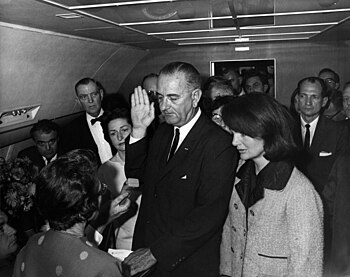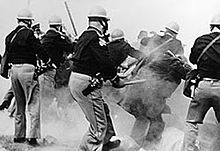Portal:1960s
The 1960s Portal
The 1960s became synonymous with the new, radical, and subversive events and trends of the period. In Africa the 1960s was a period of radical political change as 32 countries gained independence from their European colonial rulers. Some commentators have seen in this era a classical Jungian nightmare cycle, where a rigid culture, unable to contain the demands for greater individual freedom, broke free of the social constraints of the previous age through extreme deviation from the norm. Christopher Booker charts the rise, success, fall/nightmare and explosion in the London scene of the 1960s. However, this alone does not explain the mass nature of the phenomenon. Several nations such as the U.S., France, Germany and Britain turned to the left in the early and mid 1960s. In the United States, John F. Kennedy, a Keynesian and staunch anti-communist, pushed for social reforms. His assassination in 1963 was a stunning shock. Liberal reforms were finally passed under Lyndon B. Johnson including civil rights for African Americans and healthcare for the elderly and the poor. Despite his large-scale Great Society programs, Johnson was increasingly reviled by the New Left at home and abroad. The heavy-handed American role in the Vietnam War outraged student protestors across the globe, as they found peasant rebellion typified by Ho Chi Minh and Che Guevara more appealing. Italy formed its first left-of-center government in March 1962 with a coalition of Christian Democrats, Social Democrats, and moderate Republicans. Socialists joined the ruling block in December 1963. In Britain, the Labour Party gained power in 1964. In Brazil, João Goulart became president after Jânio Quadros resigned. This is a Featured article, which represents some of the best content on English Wikipedia..
Tropical Storm Brenda was the second named storm of the 1960 Atlantic hurricane season. It developed in the northeastern Gulf of Mexico on July 28, and after moving ashore over the Florida Peninsula, it attained tropical storm status. It accelerated northeast along the U.S. East Coast, ultimately peaking as a moderate storm with winds of 60 mph (97 km/h) before crossing the Mid-Atlantic states and New England; it dissipated on July 31 over southern Canada. It inflicted moderate damage in Florida, the worst since Hurricane Easy of 1950, and dropped heavy rainfall as far north as New York City. Its total damage was estimated at US$5 million, and only indirect deaths were blamed on it. (Full article...) This is a Good article, an article that meets a core set of high editorial standards.
Madhouse on Castle Street is a British television play, broadcast by BBC Television on the evening of 13 January 1963, as part of the Sunday Night Play strand. It was written by Evan Jones and directed by Philip Saville. The production featured the young American folk music singer Bob Dylan, who soon became a major musical star. The play was made with electronic video cameras, although recorded onto film rather than tape. The only known copy of the play was junked in 1968, as was the standard practice of the time, despite the fact that Dylan and lead actor David Warner were by then famous. Although extensive searches have been made by the BBC, only partial audio recordings of four songs sung by Dylan survive. (Full article...) Selected picture - Lyndon B. Johnson taking the U.S. Presidential Oath of Office on Air Force One following the assassination of John F. Kennedy in Dallas on November 22, 1963. He was sworn in by Judge Sarah T. Hughes, making him the first President sworn in by a woman. Johnson was not sworn using a Bible; none could be found aboard the plane. A Roman Catholic Missal was discovered in Kennedy's desk, and this book was used during the swearing-in ceremony.
Did you know -
Related portalsThis is a Featured article, which represents some of the best content on English Wikipedia..
"Hey Jude" is a song by the English rock band the Beatles that was released as a non-album single in August 1968. It was written by Paul McCartney and credited to the Lennon–McCartney partnership. The single was the Beatles' first release on their Apple record label and one of the "First Four" singles by Apple's roster of artists, marking the label's public launch. "Hey Jude" was a number-one hit in many countries around the world and became the year's top-selling single in the UK, the US, Australia and Canada. Its nine-week run at number one on the Billboard Hot 100 tied the all-time record in 1968 for the longest run at the top of the US charts, a record it held for nine years. It has sold approximately eight million copies and is frequently included on music critics' lists of the greatest songs of all time. The writing and recording of "Hey Jude" coincided with a period of upheaval in the Beatles. The ballad evolved from "Hey Jules", a song McCartney wrote to comfort John Lennon's young son Julian, after Lennon had left his wife for the Japanese artist Yoko Ono. The lyrics espouse a positive outlook on a sad situation, while also encouraging "Jude" to pursue his opportunities to find love. After the fourth verse, the song shifts to a coda featuring a "Na-na-na na" refrain that lasts for over four minutes. (Full article...) This is a Good article, an article that meets a core set of high editorial standards.
Edson Arantes do Nascimento (Brazilian Portuguese: [ˈɛtsõ aˈɾɐ̃tʃiz du nasiˈmẽtu]; 23 October 1940 – 29 December 2022), better known by his nickname Pelé (Brazilian Portuguese: [peˈlɛ]), was a Brazilian professional footballer who played as a forward. Widely regarded as one of the greatest players of all time, he was among the most successful and popular sports figures of the 20th century. His 1,279 goals in 1,363 games, which includes friendlies, is recognised as a Guinness World Record. In 1999, he was named Athlete of the Century by the International Olympic Committee and was included in the Time list of the 100 most important people of the 20th century. In 2000, Pelé was voted World Player of the Century by the International Federation of Football History & Statistics (IFFHS) and was one of the two joint winners of the FIFA Player of the Century, alongside Diego Maradona. Pelé began playing for Santos at age 15 and the Brazil national team at 16. During his international career, he won three FIFA World Cups: 1958, 1962 and 1970, the only player to do so and the youngest player to win a World Cup (17). He was nicknamed O Rei (The King) following the 1958 tournament. With 77 goals in 92 games for Brazil, Pelé held the record as the national team's top goalscorer for over fifty years. At club level, he is Santos's all-time top goalscorer with 643 goals in 659 games. In a golden era for Santos, he led the club to the 1962 and 1963 Copa Libertadores, and to the 1962 and 1963 Intercontinental Cup. Credited with connecting the phrase "The Beautiful Game" with football, Pelé's "electrifying play and penchant for spectacular goals" made him a global star, and his teams toured internationally to take full advantage of his popularity. During his playing days, Pelé was for a period the best-paid athlete in the world. After retiring in 1977, Pelé was a worldwide ambassador for football and made many acting and commercial ventures. In 2010, he was named the honorary president of the New York Cosmos. (Full article...) Selected article -The Selma to Montgomery marches were three protest marches, held in 1965, along the 54-mile (87 km) highway from Selma, Alabama, to the state capital of Montgomery. The marches were organized by nonviolent activists to demonstrate the desire of African-American citizens to exercise their constitutional right to vote, in defiance of segregationist repression; they were part of a broader voting rights movement underway in Selma and throughout the American South. By highlighting racial injustice, they contributed to passage that year of the Voting Rights Act, a landmark federal achievement of the civil rights movement. Since the late 19th century, Southern state legislatures had passed and maintained a series of Jim Crow laws that had disenfranchised the millions of African Americans across the South and enforced racial segregation. The initial voter registration drive, started in 1963 by the African-American Dallas County Voters League (DCVL) and the Student Nonviolent Coordinating Committee (SNCC) failed as local White officials arrested the organizers and otherwise harassed Blacks wishing to register to vote. The passage of the Civil Rights Act of 1964 legally ended segregation but the situation in Selma changed little. The DCVL then invited Rev. Martin Luther King Jr. and the activists of the Southern Christian Leadership Conference (SCLC) to amplify the efforts, and these figures drew more prominent people to Alabama. Local and regional protests began in January 1965, with 3,000 people arrested by the end of February. On February 26, activist and deacon Jimmie Lee Jackson died after being shot several days earlier by state trooper James Bonard Fowler during a peaceful march in nearby Marion. To defuse and refocus the Black community's outrage, James Bevel, who was directing SCLC's Selma voting rights movement, called for a march of dramatic length, from Selma to the state capital of Montgomery, calling for an unhindered exercise of the right to vote.[page needed] (Full article...) More Did you know (auto generated)
TopicsCategoriesWikiProjects
Associated WikimediaThe following Wikimedia Foundation sister projects provide more on this subject:
Discover Wikipedia using portals |





























